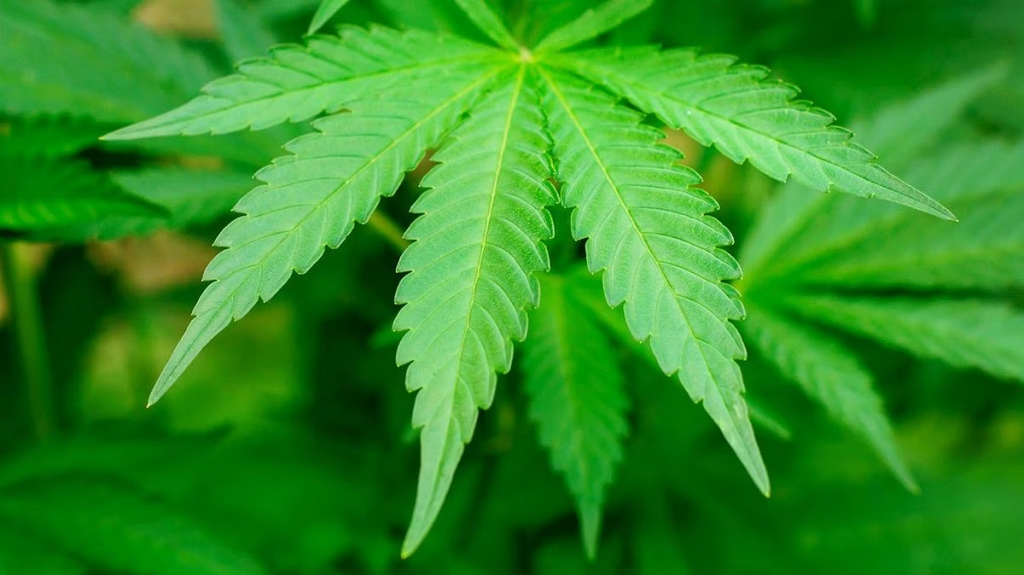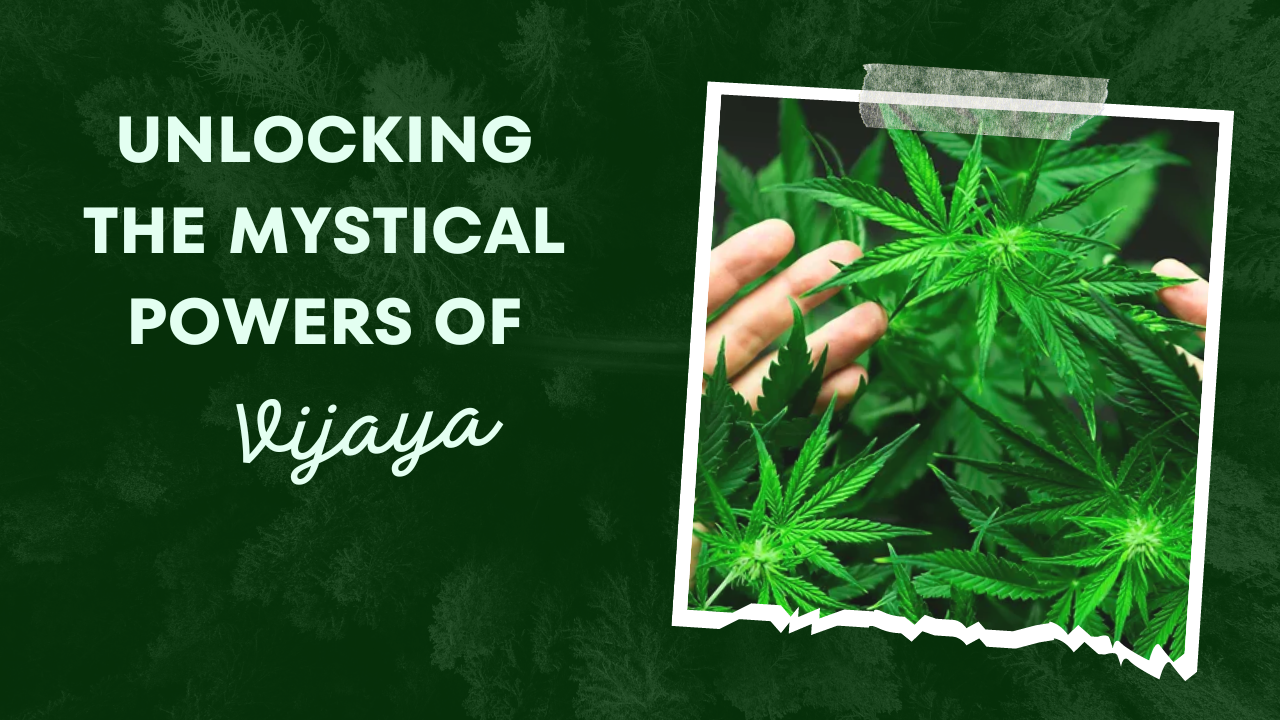No products in the cart.
Unlocking the Mystical Powers of Vijaya: Exploring the Spiritual and Medicinal Benefits of Cannabis
Cannabis has a rich and complex history, dating back to ancient times. Many cultures have used cannabis for spiritual and medicinal purposes, and its use was documented in ancient texts such as the Vedas in India and the Bible. Cannabis was used for a variety of reasons, including pain relief, relaxation, and spiritual enlightenment. As the use of cannabis spread across the world, different cultures developed their own unique traditions and practices around the plant.
For the purposes of this blog post, we will focus on the spiritual and medicinal uses of cannabis, and specifically on Vijaya. Vijaya is a Sanskrit name for cannabis, which translates to “victory” or “conquest”. In Hindu mythology, Vijaya is associated with the god Shiva and is considered to be a sacred herb that can help one attain higher states of awareness. We will explore the spiritual and medicinal benefits of Vijaya in more detail later in this post.
Overall, the purpose of this post is to shed light on the many benefits of cannabis, and to help demystify the plant for those who may be unfamiliar with it. We hope that by the end of this post, you will have a greater appreciation for cannabis and its potential to heal both the body and the spirit.
Spiritual Uses of Vijaya

One of the most fascinating aspects of cannabis is its use in spiritual practices and rituals. Many cultures around the world have used cannabis as a sacrament or aid to help them connect with the divine or attain higher states of consciousness. In this section, we will explore the various spiritual traditions that use cannabis, as well as examples of spiritual practices that incorporate cannabis use.
One of the most well-known examples of cannabis use in a spiritual context is in Rastafarianism. The Rastafari movement, which originated in Jamaica in the 1930s, sees cannabis as a sacrament that helps users to connect with Jah (God). Rastafarians often use cannabis in a ritualistic way, smoking it in a group to enhance their spiritual experience and to achieve a sense of unity with others.
Cannabis is also used in certain Native American traditions. The use of cannabis is thought to help users enter into a state of heightened awareness, allowing them to connect with nature and the spirit world. Cannabis is often used as part of a vision quest or other spiritual ceremony, and it is considered a sacred plant that can help users connect with the divine.
Insights into how cannabis can enhance mystical experiences are still being studied, but there is evidence to suggest that cannabis can help users to achieve a sense of euphoria and relaxation, which can help them to enter into a meditative state more easily. Cannabis can also help users to feel more connected to their surroundings, which can lead to a greater sense of spirituality and oneness with the universe.
Overall, the spiritual uses of Vijaya are varied and fascinating. From Rastafarianism to Native American traditions, cannabis has been used for centuries to help users connect with the divine and attain higher states of consciousness. While the use of cannabis in a spiritual context is still somewhat controversial, there is evidence to suggest that it can have real spiritual benefits for those who use it responsibly.
Medicinal Uses of Vijaya

Aside from its spiritual uses, cannabis has also been recognized for its medicinal properties. In recent years, there has been a growing interest in the potential of cannabis to treat a wide range of medical conditions. In this section, we will explore the medicinal uses of Vijaya and how it interacts with the human body.
There are many medical conditions that cannabis is known to alleviate, including chronic pain, anxiety, depression, and nausea. Cannabis has also been shown to be effective in treating epilepsy, multiple sclerosis, and other neurological disorders. Furthermore, some studies have suggested that cannabis may have anti-tumor properties and could be used to treat cancer.
So how does cannabis work in the body? The answer lies in the endocannabinoid system. This system is responsible for regulating a wide range of bodily functions, including appetite, mood, sleep, and immune function. The endocannabinoid system works by producing naturally occurring cannabinoids, which bind to receptors in the brain and body.
Cannabis contains over 100 different cannabinoids, including THC and CBD. When cannabis is consumed, these cannabinoids bind to the same receptors in the endocannabinoid system as the body’s natural cannabinoids. This can lead to a wide range of effects, depending on the specific cannabinoids and the dosage consumed.
There are many different methods of consuming cannabis for medicinal purposes, including smoking, vaping, edibles, and tinctures. The dosing and method of consumption will depend on the specific medical condition being treated and the individual’s tolerance and preferences. It is important to work with a healthcare provider to determine the best course of treatment and to ensure that cannabis is used safely and responsibly.
Overall, the medicinal uses of Vijaya are vast and promising. From chronic pain to cancer, cannabis has the potential to treat a wide range of medical conditions, and its effects on the human body are still being studied. As more research is conducted, we may discover even more ways in which cannabis can be used to heal the body and mind.
Legal and Social Context of Vijaya Use

espite its many potential benefits, the use of cannabis has long been stigmatized and criminalized. In this section, we will explore the legal and social context of Vijaya use, including its history of prohibition and recent legalization efforts, the ongoing stigma around cannabis use, and the potential impact of greater acceptance of cannabis on society.
Cannabis was first criminalized in the United States in the early 20th century, and its use was heavily stigmatized in the decades that followed. The so-called “War on Drugs” of the 1980s and 1990s led to even harsher penalties for cannabis offenses, and many people were imprisoned for nonviolent drug offenses related to cannabis. However, in recent years, there has been a growing movement to legalize cannabis for medicinal and recreational use.
As of 2023, cannabis is legal for medicinal use in 36 U.S. states and for recreational use in 15 states. However, cannabis is still illegal at the federal level, which has led to confusion and inconsistency in how the drug is regulated and enforced. The ongoing legal limbo surrounding cannabis has made it difficult for users to access the drug safely and legally.
Despite the growing acceptance of cannabis, there is still a significant amount of stigma around its use. Many people still view cannabis users as lazy, unmotivated, or even dangerous. This stigma can have real-world consequences for users, such as discrimination in employment or housing, and can make it difficult for users to access the medical care they need.
However, as more research is conducted on the potential benefits of cannabis, and as more states legalize its use, we may begin to see a shift in how cannabis is perceived by society. Greater acceptance of cannabis could lead to a reduction in opioid use and other harmful behaviors, as well as a decrease in incarceration rates for nonviolent drug offenses. It could also lead to greater access to safe, regulated cannabis products for those who need them.
While Vijaya use has a complex legal and social history, the growing movement to legalize and destigmatize cannabis could have significant benefits for individuals and society as a whole. As we continue to explore the spiritual and medicinal potential of cannabis, it is important to also examine the legal and social context in which it is used.
Fun Facts
1. The word “cannabis” is derived from the ancient Greek term for hemp, “kánnabis.”
2. Cannabis has been used for thousands of years in traditional medicine and spiritual practices around the world, from ancient Egypt to modern-day India.
3. The first recorded use of cannabis for medicinal purposes dates back to Chinese Emperor Shen Nung in 2737 BC.
4. The psychoactive compound in cannabis, THC (tetrahydrocannabinol), was first isolated and identified by Israeli scientist Raphael Mechoulam in 1964.
5. The world’s largest joint was rolled in 2017 in California and measured over 30 feet long.
6. The oldest recorded use of cannabis for spiritual purposes is from the ancient Hindu text, the Atharva Veda, which dates back to around 2000 BC.
7. Cannabis was outlawed in the United States in 1937 under the Marijuana Tax Act, which imposed heavy taxes and regulations on the plant and effectively criminalized its use.
8. The first state to legalize medical cannabis in the United States was California in 1996.
9. In Jamaica, it is traditional to use cannabis as a religious sacrament and offer it to the gods during ceremonies.
10. Cannabis has been shown to have a wide range of potential medicinal benefits, from reducing inflammation and pain to treating symptoms of anxiety and depression. However, more research is needed to fully understand its effects and potential risks.
Conclusion

In this blog, we have explored the mystical powers of Vijaya, also known as cannabis. From its spiritual significance in Hinduism to its potential medicinal benefits, we have delved into the many ways in which this powerful plant can be used to heal the mind and body.
While the spiritual and medicinal benefits of Vijaya are vast and varied, it is important to remember that this plant is also a powerful substance that should be used with caution and respect. As we continue to learn more about the potential benefits and risks of cannabis use, it is crucial that we approach this plant with mindfulness and responsibility.
For those who choose to use Vijaya for spiritual or medicinal purposes, it is important to do so safely and legally. This may mean working with a healthcare provider to determine the best course of treatment or using regulated and tested cannabis products.
Ultimately, the key to unlocking the mystical powers of Vijaya lies in understanding and respecting this plant. By continuing to explore its spiritual and medicinal potential, while also advocating for responsible use and greater acceptance in society, we can harness the power of this ancient plant and pave the way for a more enlightened future.
In conclusion, we encourage all readers to learn more about the spiritual and medicinal benefits of Vijaya and to advocate for responsible cannabis use. Whether you are a spiritual seeker, a healthcare provider, or simply someone interested in the potential of this powerful plant, there is much to be gained from a deeper understanding of Vijaya and its many uses.




Leave a Reply